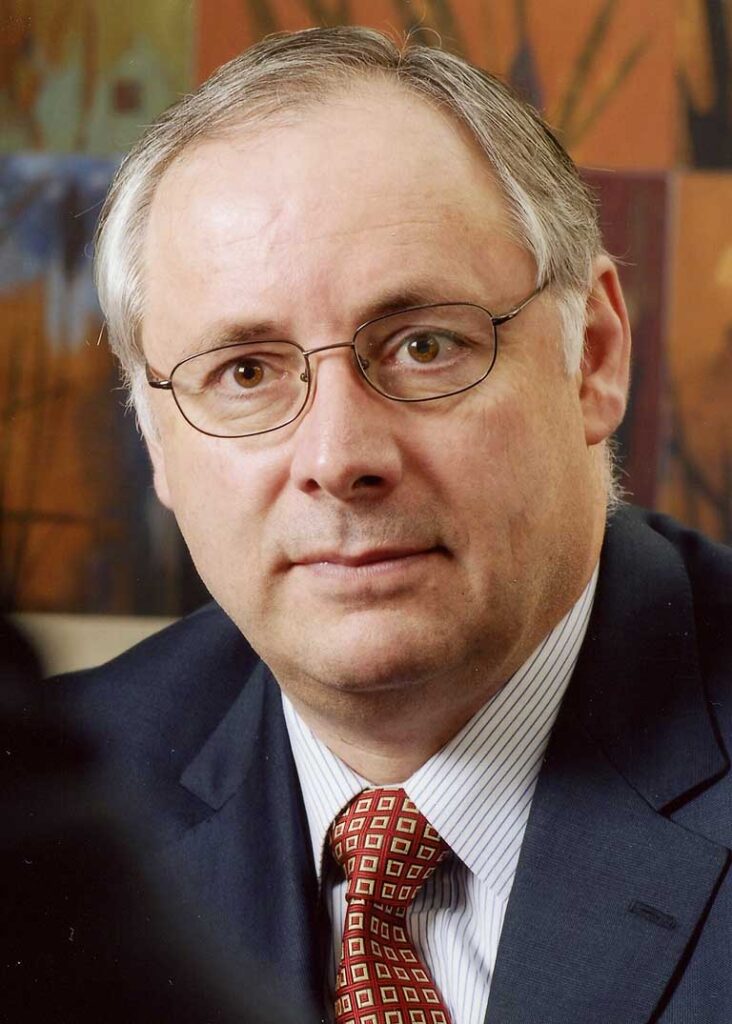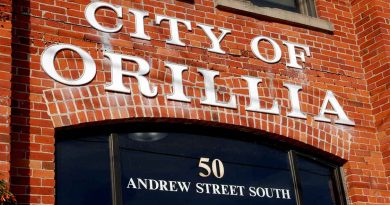Changing The Guard at Orillia Power Generation Corp.
By John Swartz
The leadership of Orillia Power Generation Corporation is changing at year’s end. Both board chair Greg Gee and CEO/president Grant Hipgrave are retiring.
Both were already involved with OPC when Hydro One came knocking in 2015 with overtures to buy the distribution side of the company, but assumed their leadership roles months later.
Hipgrave began with OPC in 2006.
“My background is originally in finance (telecom and insurance), so I came into the organization in a financial capacity and had a couple roles in that area and moved into operations for bit and on to this position,” Hipgrave said.
Gee retired from a corporate law career, changing his residency status from being a weekender, to permanent.

“The CAO of the City at the time (Gayle Jackosn) contacted me and said there’s an opening,” Gee said. “I’d like to see you put your hat in the ring.” So began Gee’s 11 year tenure on the board, 9 as chair.
“I had just moved up to Orillia and I had gone on the board of the hospital and actually was board chair for 4 years and I was coming to the end of my term there. I decided I’d still like to be involved with the City and contribute if I could.”
With the Hydro One situation in play it was the City of Orillia’s good fortune to have the two key positions at OPC being filled with people experienced in finance and acquisitions. Gee moved from working for hire as part of a major Toronto firm, to in-house head of legal in the automobile manufacture sector and with financial institutions; he also served on boards in those sectors as well as with the Ontario housing regulator and several charities.
“I spent a lot of time in terms of my practice was related to board governance, so I knew quite a bit about the subject,” Gee said. “I didn’t know much about running a hospital or a power generation company. You’d be surprised how many transferable skills there are in this sort of general business; things like HR issues, construction issues.”
Getting more than a price for the distribution assets was a key part of the deal.
“In the end it’s been a great thing for the City of Orillia. That was really what the objective of the whole transaction was, if we were to sell the distribution side, apart from just getting paid for it – and we did quite well – it’s considered the model transaction for other utilities that were eventually sold as well; (was) getting the commitment to build the grid control center, which is now up, and there are two more buildings that are in the process of being built,” Gee said.
“Those are just great long-term, permanent contributions. Not just for employment; (but) the tax base for the City as well as all the other secondary contributions businesses make. I think overall I feel it was the right decision for the City and I was happy to be part of that.”
Following the closing of the sale, the OPC changed its name to Orillia Power Generation Corporation. Under both names the company went over 16 years without a lost-time injury, and the clock is ticking now at over one year. The record is not shared by many in the industry; safety is of prime interest for Hipgrave.

“I know our record is admirable. I think anybody that can go 17 years without a lost-time injury – we’ve won some awards,” Hipgrave said.
“You’re deal with high voltage equipment, on the generation side you’re dealing with moving equipment, rotating equipment with turbines and such, you’ve got to be vigilant every day, every hour of every day.”
“Health and safety is our responsibility. The management team, workers, everyone is part of it. Obviously we take it very seriously. As I say to our guys all the time, the most important thing to me is seeing all of you going home safely each day to your families.”
Making money, which results in dividend cheques to the City of Orillia, is also important. Even in years with lower revenues, the OPGC still made money. There are utilities that don’t make money.
“I’m sure there are situations where some go in the red in a given year. Obviously our revenue stream is dependent on water flows and they do vary over periods, but when you take a longer term approach, in the long term we know we’re going to continue to be profitable,” Hipgrave said. “I don’t take all the credit for it. We’ve got a great team here and a good board.”
Being healthy financially allowed OPGC to expand. Looking ahead, the company had invested more than $2 million in developing a new hydro generating station near Peterborough and was months away from starting construction when the new Ontario government hastily cancelled almost 700 contracts for new generating capacity (which included solar and wind projects around the province).
“Energy is a provincial jurisdiction and the government changes every 4 years and there’s a different focus so we definitely have to always be in tune with what’s going on with the ministry of energy and the IESO (Independent Electricity System Operator),” Hipgrave diplomatically said.
When that happened the company took a write down on the loss and still posted a profit for the year.
“I think what was interesting, and I don’t claim any particular responsibility for this, there was a lot of change and progress during my ten of so years there. We had three generating stations when I joined. We then added solar, we put a lot of work into trying to build a new water station of our own; that was about 8 years of work that went into that. We then bought the (three) Shayman stations and sold the distribution business in the same year. And we did a lot of upgrading of our power sites (tens of millions of dollars in refurbishing plants). Overall, for ten years in the utility business there was a lot going and there was never a dull moment. I really enjoyed my time there. There’s a lot of good people there,” Gee said.
Both will continue to call Orillia home, and both have no grand projects or interests for their new free time.
“I’ve got interests and hobbies, a family and some new grand children, I won’t have trouble filling my days,” Hipgrave said.
“I live right on the golf course and believe it or not, I used to do something like 75,000 miles in the air every year. If I came home and told my wife I was going out golfing she’d probably say you should just keep going. I never spent any time golfing. I’m happy to sit on my back porch and watch golf.” Gee said. “Apart from the fact I have 7 grandchildren, I’ll try to spend more time with my kids and grandkids. We still love to go boating and we go south in the wintertime. I think it will just give us more flexibility.”
As a parting thought, Gee was asked about the presentation Sustainable Orillia made to Orillia council at the beginning of September. In it they stated in order to be energy self-sufficient, and green, Orillia needed to add 62 MW to its generating capacity from the current 23 MW. Gee took a wider approach than just the local concern in answering .
“I can say, generally speaking, if things unfold as people are predicting, the amount of supply we are going to need is dramatically different than what we’re producing now as a province overall. There’s a lot of work that’s going to have to be done on infrastructure before that’s going to become reality and I don’t know where the plan is to make all that happen, I can tell you that,” Gee said.
The last day for both is December 31. The board has already hired Shaun C. Hinds (most recently director of plant operations with Ontario Power Generation Corp. after a 22 year career with the same and 11 years previously with Ontario Hydro) to replace Hipgrave. The City is currently searching for someone to replace Gee on the board.
(Photos by Swartz – SUNonline/Orillia)




